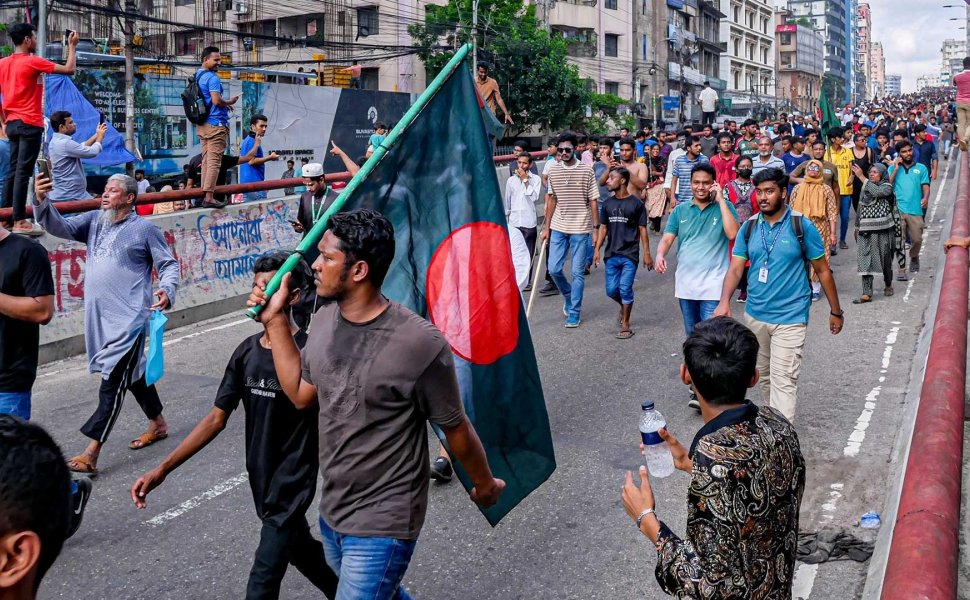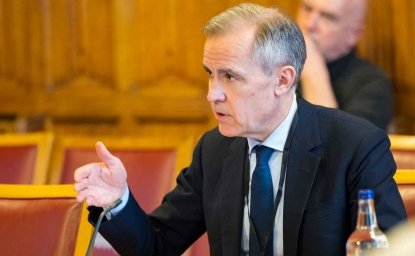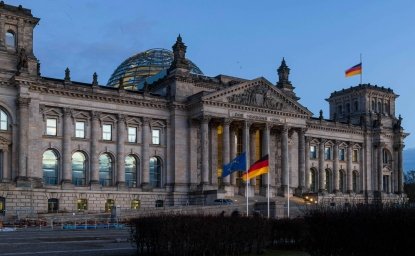This transcript has been lightly edited for clarity.
John Milewski: Welcome to the Need to Know podcast from the Wilson Center, a podcast for policymakers available to everyone. Always informative, nonpartizan and relevant. We go beyond the headlines to understand the trend lines in foreign policy.
Welcome back to another episode of Need to Know. I'm your host, John Milewski. Need to know is a podcast produced by the Woodrow Wilson International Center for scholars. The center is congressionally chartered, scholarship driven, and fiercely nonpartisan. Need to know is a podcast for policymakers available to everyone. Well, it's been just over a month since a youth led movement in Bangladesh ended.
Prime Minister Sheikh Hasina as 15-year rule protests against a quota system for government jobs escalated into a full-scale rebellion. More than a thousand people lost their lives, with many more injured. Now, an interim government is attempting to pick up the pieces and deliver on promises of change. Here to help us sort things out is the director of the South Asia Institute at the Wilson Center, Michael Kugelman.
Michael welcome back. Great to see you. Thanks for joining us.
Michael Kugelman: Thanks. Good to be back with you.
JM: So, Michael, the interim leader, Nobel laureate Muhammad Yunus, and other officials held talks in DACA on Sunday with the U.S. delegation in this past Sunday. Anything significant come from that?
MK: There wasn't that anything that significant, but I don't think there was anything significant expected. I think that for the US officials that were there, and they represented a wide variety of government agencies state, USA, Treasury, a few others. I think the main goal was to convey to the interim government that they are committed to helping Bangladesh. Stabilize itself, particularly the economy.
The US has indicated strong interest in helping this interim government carry out a series of economic reforms and broader institutions of reform. So, I think the main message from these visiting US officials was essentially that, we're here to let you know that we want to help.
JM: Does the current leader plan to stick around, or is he in a caretaker role?
MK: Well, I mean, this is one of the there are many, uncertainties about Bangladesh's future right now. Well, that's one of the main ones. And this, this interim government has not indicated, when it plans to give way to elections. It has not indicated how long it plans to stay in power, per the Bangladesh Constitution. Any interim government should only be in power for three months.
I think it's highly unlikely that this interim government will, will dissolve, so to speak, within that time period. But I think that, you know what these folks want to do, what Yunus and others in the interim government want to do is take the time that they feel is necessary to strengthen, the country's institutions, which have become very corrupt and politicized over the years.
And they feel that it's important to make those changes before you go to elections, because if you quickly go to elections before carrying out those reforms, then the country is really not going to be in a better place.
JM: Yeah, three months, certainly not a lot of time considering the task at hand. The meeting on Sunday, the phrase that emerged afterwards was reset, reform, restart. Easier said than done. That sounds neat and tidy. But give us a sense of how heavy a lift this is. And what are the things that need to happen?
MK: Yeah, alliteration always makes things seem easier and makes things sound nice. But yeah, this is Bangladesh. I think it's important not to sugarcoat here. Bangladesh has immense challenges ahead of itself. You know, one of them and one of the immediate ones has been the main challenge from the very start since Sheikh Hasina left and resigned. And that is to restore law and order.
We had seen a number of cases, retributive violence, being carried out by violent actors. This has been a major concern for many in Bangladesh. Stability has returned in a broad sense, and you're not seeing the levels of violence playing out now that you were in the immediate days after, Sheikh Hasina left the country. But that's still a concern.
But also, the economy stabilizing the economy is going to be a big challenge. We've seen over the last few years the growth story that so many had talked about happening in Bangladesh, really falling apart. You know, this is a country that experiencing rising levels of inflation, power cuts, things like that. So that will continue to be a challenge.
But I think that the most that one of the more difficult challenges moving forward, which is a longer term, one gets back to what we were discussing before the reforms plan. You know, it's very important for this country to ensure that its financial institutions, that its public institutions on the whole, are, depoliticized, are not corrupt and that, respect accountability.
You know, these things had all become issues in the Hasina era, unfortunately. But it's going to be very difficult to pass through those reforms. There's always going to be vested. Interests are always going to be those in the bureaucracy that push back against reforms. But, you know, this is something that has to happen, but it will certainly take a very long time.
And the final point I'll make here on the challenges ahead. Politics in Bangladesh have been incredibly polarized for years. Of course, many countries have polarized politics, but in Bangladesh it's played out very violently for quite some time. And I think that that concern is that these, retaliatory, retributive, acts of violence that have been carried out by partizans of those that are now in power, so to speak, concerns, it's going to be difficult to rein it in.
And there have been cases of, leaders of Sheikh Hasina party that have been arrested on charges that appear to be politically motivated. That has to stop, I think, for the country to really move forward.
JM: Hasina, recently, there were reports that she's talking about returning to the country sometime soon. What should we make of that?
MK: I don't think that's very likely at all. There's been a lot of mixed messaging from Sheikh Hasina, I know, speaking for her, which mainly consists of her son, who's based in Virginia. A lot of mixed messages about what she plans to do. I do think that she wants to come back. I don't think she's ready to to retire from politics, but realistically, I can't imagine her being in a position to return because if she did, she would likely be arrested.
JM: So, talk to us a bit about U.S. interests. I was interested to learn that when it comes to the garment and textile industry, Bangladesh is second only to China in terms of U.S. reliance. I don't know if the average American knows that. I know you mentioned to me before we began recording that you see a renewed interest on Capitol Hill in Bangladesh.
One of the reasons that we've invited you to do a need to know, talk to us about U.S. interests.
MK: Well, it's true that, the US, for quite some time has been the top, destination for Bangladeshi exports. And Bangladesh is essentially a one export town, so to speak, in terms of its economy. So that means that rugs, readymade garments. So yeah, significant majority of those come to the US, and yet the US has been dependent on them for for quite some time.
So, we've seen trade interest and commercial ties between the US and Bangladesh pick up in a big way over the, over the, over the last decade or so, mainly because of the RMG, factor sector. But I would argue that on a broader strategic level, US interests have have really evolved when it comes to Bangladesh in that, you know, so much in Washington now is look, that, you know, so much is so much of U.S. foreign policy is conducted through the lens of great power competition.
And you look at Bangladesh, where it sits geographically, it sits astride the, the Indian Ocean region. It's a gateway to, to the Middle East. It's it occupies a really critical spot. Also, you have the major powers, presence in Bangladesh in the sense that China has significant numbers of investments, infrastructure investments in Bangladesh. India is also has also been very close to Bangladesh, very quietly.
Russia also has been quite influential in Bangladesh, particularly through investing in its, in its nuclear power sector. And the US, of course, has trying to, you know, navigate great power competition by countering China and Russia its competitors of course. But Bangladesh has really been right in the middle of this because Bangladesh, like many countries in South Asia, is not aligned in the sense that it wants to have good relations with all these different players.
But that certainly, I think, causes some concerns for the US. When you look at how, how close and friendly the ties are between Bangladesh and China and Bangladesh and Russia.
JM: Michael, about some of those ties, Bangladesh had been viewed as a moderate Islamic state by the U.S under the Hasina rule. China's Belt and Road initiatives and deals were cut during that rule. How does the new regime compare in terms of his external relations, the influence of religion, the influence of the military? How does it compare to what came before?
MK: Yeah. So, I think that, when it comes to foreign policy, this is not a priority for the interim government as of yet. It's focusing on stabilizing the internal situation. I do think that this government will continue with the policy. We've seen, in previous governments in Bangladesh, and that's essentially to manage relations with the major powers.
So, I will say that the Sheikh Hasina government had very close ties with India, particularly with the, with the Modi government. And I think that there are some concerns, certainly in India, that the new government will not feel the need to ensure such close ties with India. In fact, you have many actors within this interim government that have been very critical of of India and their concerns in India and elsewhere that this new government may want to push them closer to China.
Now, Sheikh Hasina pushed quite close to China in the Sheikh Hasina era, military ties between Bangladesh and China went up in a big way. But I do think that there are some concerns that Bangladesh, this new government, may no longer feel. It may not feel as constrained as the previous government in Bangladesh about pushing closer to China for fear of upsetting India.
That won't be as much of an issue. Now you cite the issue of Islam and Bangladesh being regarded as a moderate, Muslim majority state. That's still the case. But I do think that one troubling consequence of the change in power and the change in government in Bangladesh is that, unfortunately, some hardline religious elements, particularly Islamist elements, have been emboldened.
You know, unfortunately, there are some actors in Bangladesh, particularly a major political party, the Jamaat e Islami, that is, has been allied with some of the political parties that have benefited from this change of power because they were rivals of Sheikh Hasina. Sheikh Hasina herself and her party, projected themselves as relatively secular in the sense that they sought to, push back to the extent that they could on hardline, Islamism, crackdown, very hard crackdown, very hard on, on Islamist militancy when that was a big issue some years back.
The new government is, is a bit different, and I think that there will be a tendency on the part of this new government to be very careful about how it treats these, these religious groups. And, you know, one example that I'll point to in this front that I think is very concerning for many of us here in Washington, is that some days ago, the leader of a terrorist group, an al-Qaida inspired terrorist, were called on Saro Aslam.
He was released from jail where he'd been serving some years because, his group was behind attacks on, bloggers and other liberal thinkers in Bangladesh some years ago. He was released from jail very suddenly and, according to the Bangladeshi media, charges were dropped against them. That suggests to me that you had that, you know, someone, somewhere was feeling a need to appease some of these religious, elements and essentially engage in this gesture.
This is a very troubling development, certainly for law and order and security, but also when it comes to this, these concerns about, you know, hardline Islamism, Islamic militancy.
JM: Yeah. So, given everything that you've just told us, what steps should the US take? How do you define the U.S. role in the most productive way?
MK: I mean, I think that, you know, something that we would we could ideally see from Congress as well as the administration and not just the current administration moving forward, whatever the next administration looks like post-election here, signaling a US commitment to engage with Bangladesh, and signal a commitment to continue what has been a very robust economic commercial relationship for many years.
I mean, you look at what the US has done. I talked about the trade relationship earlier. The US has also been a top, provider of humanitarian assistance to Bangladesh, particularly for its Rohingya refugee, community. The US had also been a major provider of Covid vaccines. Bangladesh, in fact, the received, of all the countries in the US providing Covid vaccines to Bangladesh at one point was number one on the list.
No country received more Covid vaccines in Bangladesh from the US. So there's that legacy. And I think given that Bangladesh has been experiencing, you know, severe levels of economic stress of late, I think it's important for, you know, the US administration and for the Congress to some extent, to to signal that that intent and, you know, wanting to to work with Bangladesh, a country that, you know, has been, you know, not not a top strategic partner of the US by any means, but still, you know, a friendly, a friendly partner, one, friendly partner, one that has seen relations on economic but also strategic levels grow over the years.
And I think from a great power competition lens for that reason alone, I think it's important for the US to, to signal its continued, friendship with Bangladesh. You know, given that China and Russia will be we'll be there ready to, to exploit what they think might be any type of chance that the US would want to pull back from Bangladesh at a moment when Bangladesh is experiencing all these challenges.
JM: So, we talked about this renewed interest on Capitol Hill. What should members of Congress and staff members be watching in terms of trends, to see how this is all, unraveling or maybe unraveling? It's the wrong word, right? How it's progressing is really the word that I was searching for.
MK: Yeah. And I think one thing, one thing to watch is the economy. I mean, we've seen inflation remains quite high in Bangladesh. And the, the state bank in Bangladesh, has said that it's going to keep interest rates high for a while. So, you know, that that suggests that, you know, common people could continue to experience hardships.
But, yeah, I think that this government has pledged it's saying and doing the right things. It's pledged economic reforms. It has taken a series of steps to try to stabilize the economy. But, you know, if the economy does not stabilize, I think there's the risk of more instability goes up because, you know, I think that there were significant levels of public support for the mass movement, obviously.
Otherwise, it wouldn't be a mass movement. So many people in Bangladesh are happy to see this fresh start with this new government. But I think if the economy goes south, I think that, you know, you could see growing levels of impatience and that could bring people back on the streets raising concerns about, you know, the economy, but also about stability.
And clearly that would be something that would be of concern here in Washington.
JM: Michael, thank you very much. Terrific briefing. For those of you, interested in learning more, you can visit Wilson center.org. If you see the programs tab at the top of your screen on the homepage, you can find the Indo-Pacific program. And that's where you'll find more for Michael and the South Asia Institute. We'll be back with another episode of Need to Know soon.
Until then, for all of us at the Wilson Center, I'm John Milewski. Thanks for your time and interest.









